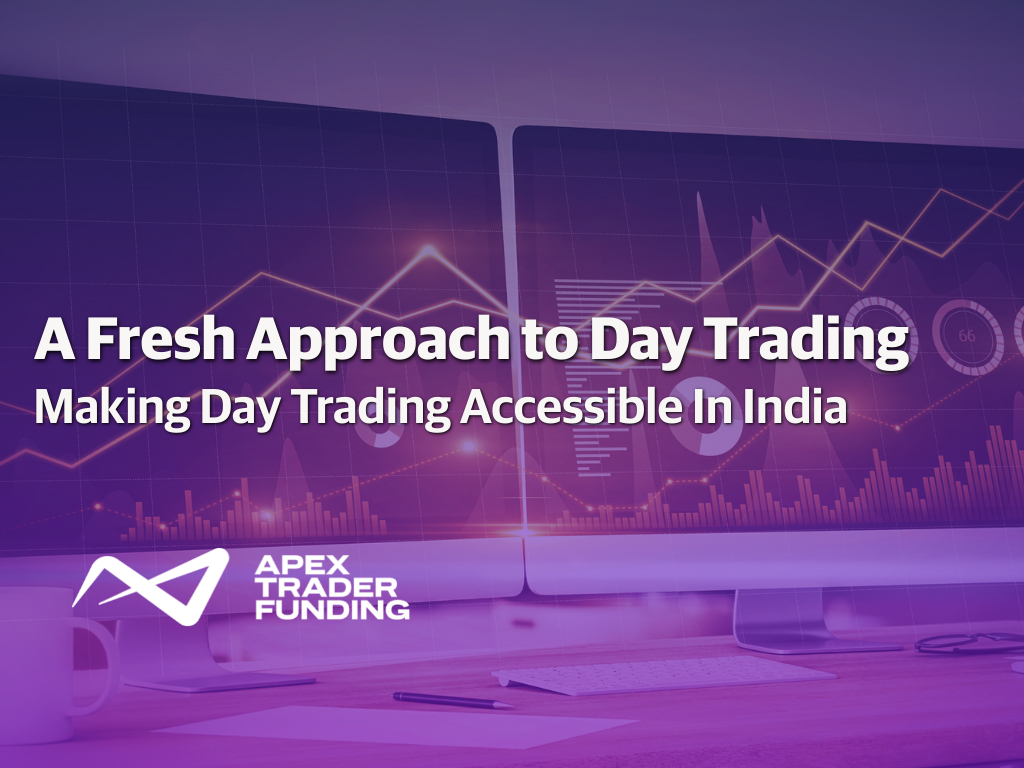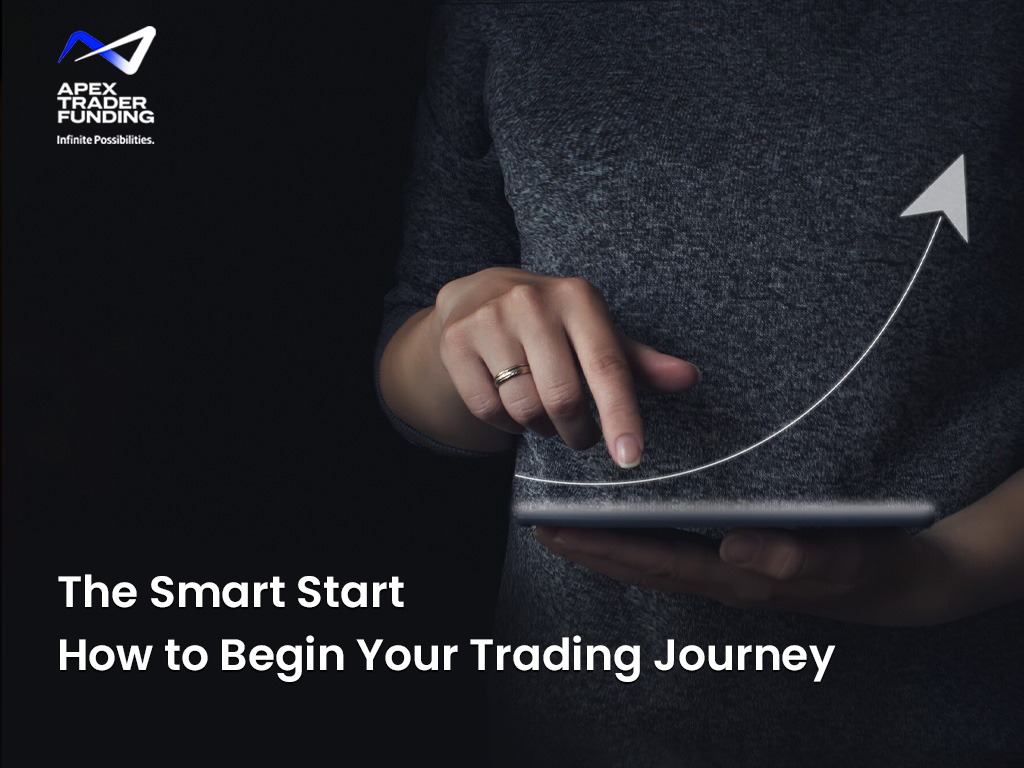
trading-education | 28-04-25
Mastering Trading Discipline with Apex Trader Funding: A Structured Approach for Modern Traders
In today’s fast-paced trading environment, strategy alone isn’t enough discipline and structure are essential to long-term success. Apex Trader Funding, one of the most recognized names in the proprietary trading space, has updated its day trading guidelines to foster a more systematic and sustainable approach. These updates include essential rules around stop loss usage, profit targeting, and trade behavior rules designed to empower traders rather than restrict them.
This article breaks down Apex's refined trading structure and explores how these guidelines can support traders and beyond in building consistent performance. Whether you're evaluating strategies or managing a funded account, adapting to these standards can help you grow within a reliable framework.
The Purpose Behind Apex’s Trading Rules
At first glance, rules might seem like constraints. However, for traders aiming for longevity, they are tools that enforce order, reduce impulsivity, and elevate professionalism. Apex’s rules aren’t arbitrary; they're crafted to promote the kind of accountability found in institutional environments.
For traders looking to engage in futures trading through funded trading accounts, this structure offers more than just risk control. It acts as a behavioral anchor. Rules such as mandatory stop losses or consistent trade sizing help reduce overtrading and emotional decisions. They encourage traders to view each trade as part of a larger statistical edge, not a one-off attempt to guess market direction.
Incorporating these principles into your routine doesn’t only improve your trading it helps align your habits with the expectations of elite trading firms. Apex’s rules provide a performance scaffold to help every funded trader track progress and build reliable systems.
Bracket Orders: Apex’s Risk Framework in Action
Apex mandates the use of bracket orders; each trade must include a pre-set stop loss and take profit. This requirement is central to Apex’s risk-first philosophy and is enforced to encourage planned trading over reactive decisions.
Bracket orders serve multiple functions. They define the boundaries of success and failure before a trade even starts. For traders executing on platforms like WealthCharts, Rithmic, or Tradovate, these parameters create clarity and improve execution quality. With Rithmic trading platform offering low-latency access and Tradovate simplifying interface usability, placing and managing bracket orders is seamless.
This rule is particularly helpful for traders who struggle with exits. By locking in the decision-making process early, traders avoid second-guessing and reduce the influence of emotions. Over time, this builds consistency and improves overall risk management, especially in markets where volatility is high.
Apex’s Emphasis on Risk Awareness and Trade Planning
Risk control is not merely a technical concept, it's the backbone of trading discipline. Apex integrates this idea directly into account rules, teaching traders to think in terms of probabilities and drawdown limits rather than hoping for optimal outcomes on every trade.
For traders in India seeking to grow within funded trading accounts in India, this mindset shift is essential. Rather than focusing solely on profits, Apex urges traders to ask: What happens if I’m wrong? How much of my account am I willing to risk here? These questions encourage maturity in trading decisions.
By building this awareness into every trade, especially when using detailed platforms like WealthCharts, traders reinforce a process-driven approach. The tools available through Apex make it easier to measure and analyze this behavior in real-time critical for scaling over time.

Flexible Risk-to-Reward Ratios: A Nuanced Strategy Option
Traditional teachings often promote strict 1:2 or better risk-to-reward ratios. While this remains a sound benchmark, Apex understands that certain strategies especially high-frequency or short-term approaches may require flexibility.
For example, a strategy with a 75% win rate might profitably operate with a 1:1 or even slightly inverted ratio. Apex allows for this, as long as the trader’s overall performance justifies it. This flexibility is a unique strength in the best prop firm environments where different trading styles are respected.
By empowering traders to structure their trades based on real-world market behavior, rather than textbook ratios, Apex gives room for system diversity. Of course, this freedom comes with the responsibility to track performance metrics closely and ensure long-term profitability.
Dollar Cost Averaging Into Losses: Why It’s Prohibited
Adding to a losing trade also known as dollar cost averaging (DCA) is a high-risk behavior in leveraged markets. While common in long-term investing, it’s hazardous in futures trading, where margin and volatility can rapidly erode capital. Apex has taken a firm stance against this practice in its Performance Accounts.
The rule isn’t punitive, it's preventive. Traders are encouraged to respect their initial risk limits and cut losses quickly. By prohibiting DCA, Apex reinforces the principle that no trade is worth escalating without a sound, rule-based reason.
This aligns with institutional risk practices, where adding to losers without a clear plan is often a career-ending move. For Apex trader funding participants in India, this rule enforces discipline early, making it easier to develop sound habits.
Building on Winning Trades: Apex Encourages Momentum-Based Growth
While averaging down is prohibited, Apex supports adding to profitable positions — a method professional traders use to increase exposure only when a trade confirms the thesis. This technique allows traders to control risk early and expand positions strategically as the market moves in their favor.
Platforms like the Tradovate trading platform and WealthCharts offer tools to manage position adjustments with precision. Whether it’s adding after a breakout or during a confirmed trend, this approach helps maximize favorable trade conditions while maintaining disciplined risk control.
This rule reinforces the idea of strengthening success, not chasing losses — training traders to respond to market confirmation rather than emotion.
Evaluation vs Performance Accounts: Knowing the Difference
Apex Trader Funding offers a smart two-phase model that separates the learning phase from the performance phase, making it easier for traders to build consistency before managing real payouts. This distinction is critical especially for traders exploring funded trading accounts in India who want to scale their trading without risking personal capital too early.
Evaluation Accounts act as training grounds. They allow traders to explore their strategy with fewer restrictions. During this phase, traders are assessed on their ability to stay consistent and follow key risk principles. Apex doesn't enforce all rules here (like bracket orders or DCA bans), giving room for strategy refinement.
However, passing this phase doesn't just mean hitting a profit target. It also means demonstrating discipline, risk awareness, and psychological control. Many traders fail here not due to lack of strategy but because they ignore the importance of consistent execution. For those serious about professional development, treating the evaluation like a live account is the best preparation.
Once approved, traders graduate to Performance Accounts, where the stakes and the standards go up. Rules are strictly enforced: bracket orders become mandatory, dollar cost averaging is prohibited, and trade management is closely monitored. Performance Accounts are where traders can start collecting real payouts up to 100% on the first $25,000, and 90% thereafter if they continue to follow the system.
This separation of phases also provides clarity. Apex wants traders to grow, not gamble. And by giving them room to learn before pushing them into a stricter, payout-focused phase, the firm demonstrates why it's recognized among the best prop firms in the industry.
Visual Design and Trade Management: Navigating Bracket Order Display
Visual clarity is essential for precise trading, especially when you're operating in real-time environments on advanced trading platforms like WealthCharts, Rithmic, or Tradovate. Some traders may initially find Apex’s mandatory bracket orders visually disruptive, but this perception shifts when approached with the right tools and mindset.
Many platforms allow full customization of how bracket orders appear on your chart. For example, on WealthCharts, you can adjust line color, thickness, and opacity to minimize distraction while still ensuring compliance. On Tradovate, you can split order displays onto dedicated panels, which reduces clutter and lets you keep your primary chart view clean.
The important takeaway here is that these visual markers aren’t just aesthetic elements, they're part of a system. They serve as constant visual confirmation of your risk parameters and trading logic. When traders begin to associate these visuals with structure and safety, the psychological shift helps reduce emotional interference.
Traders using stock trading platforms in India are increasingly accustomed to fast execution and mobile access, making it even more important to integrate visuals that reinforce disciplined behavior. Instead of resisting them, traders can use these display tools to fine-tune trade timing, avoid accidental position closures, and maintain risk boundaries across volatile market sessions.
In short, bracket orders aren't visual noise, they're a visual edge. Embracing them can significantly improve your trade management and reduce execution errors in live markets.
The Apex Advantage: Why Traders Choose This Model
Apex Trader Funding offers more than access to capital; it provides a structured ecosystem tailored to support growth, discipline, and profitability. This advantage is why more traders, including those in India, are turning to Apex as their prop firm of choice.
The firm's profit payout model is particularly compelling. Traders retain 100% of their first $25,000 in profits and 90% of anything beyond that. This is a standout offering in the proprietary trading space, especially when compared to firms that offer smaller shares or higher thresholds for withdrawals. For traders who are consistently profitable, the earning potential under Apex is truly scalable.
Another key advantage lies in Apex’s accessibility. Evaluation accounts are low-cost, and regular promotional offers such as using the Apex coupon code “COPY” can bring prices down by as much as 50%. This opens the door for traders with smaller budgets, including many self-directed traders across India’s growing trading community.
Then there’s the technology. Apex integrates seamlessly with the Rithmic trading platform for institutional-grade data feeds, Tradovate for intuitive browser-based access, and WealthCharts for strategy development and visual analytics. This suite of tools supports everyone from scalpers to swing traders, all within the same funding model.
With these benefits combined with competitive payouts, accessible evaluations, world-class trading platforms, and transparent rule systems it’s clear why Apex continues to rank among the best trading platforms in India for serious traders.

Crafting a Rule-Friendly Strategy With Apex
Your trading strategy doesn’t have to be reinvented for Apex but it does need to be aligned with the firm’s structural requirements. Apex gives you room to express your edge, but demands that it fits within a framework of discipline, risk management, and statistical reasoning.
To succeed, traders should start by mapping out their process clearly: What defines your entries? What confirms your exit? How do you determine your stop loss distance and take profit targets? With mandatory bracket orders in place, these decisions must happen before the trade is live, not during.
Next, consider how you will manage risk across multiple trades. For traders on Rithmic, you can automate position sizing based on volatility. For those using WealthCharts, dynamic risk calculators help maintain consistency across different setups. These tools help ensure that no single trade breaks your daily loss limits or your long-term drawdown threshold.
In India, where many traders are transitioning from discretionary strategies to more systematic methods, Apex’s structure offers a valuable training ground. It’s not about following someone else's system, it's about building your own, with clear rules and repeatable execution.
Also, consider adding scaling logic. Also, consider incorporating position-building tactics. Apex allows traders to add to winning positions, so you can develop strategies that increase size gradually during favorable market moves. Just be sure these additions are based on technical criteria, not emotion. That’s what separates professional strategy from reactive trading.
Common Mistakes and How to Avoid Them
One of the easiest ways to fail under Apex’s model is to ignore the small things like forgetting to place bracket orders or treating Evaluation and Performance Accounts the same. These errors often stem from complacency or a lack of preparation.
Traders in India and globally should treat every stage seriously. Log every trade. Review risk-to-reward consistency. Use platform tools to journal and analyze. Stick to plans rather than reacting in real-time. The Apex model rewards traders who take ownership of their process.
Growth Through Rules: Turning Structure Into Strength
Rules are often seen as limiting, but in the context of trading, they are the very architecture of consistent performance. Apex Trader Funding’s system of structured guidelines doesn’t exist to hold traders back, it exists to elevate them. Each rule, from bracket order compliance to DCA prohibition, is a prompt to trade with intention rather than emotion.
For traders in India seeking to professionalize their strategies, this structure serves as a training ground for building strong decision-making habits. The moment a trader stops resisting rules and begins to work within them, their focus shifts. They stop chasing outcomes and begin the execution process.
This transformation is supported by data-driven platforms like WealthCharts, which help traders analyze outcomes over time and adjust accordingly. Every decision, every outcome becomes part of a feedback loop that improves performance. Instead of repeating mistakes, traders learn, adapt, and optimize.
Apex doesn’t merely offer capital, it offers a framework that shapes traders into strategic thinkers. The discipline you build under Apex’s system will serve you well not just in this environment, but in any trading arena you enter going forward. That’s how structure, far from being restrictive, becomes the foundation of your growth.
Conclusion: Structure Enables Performance (Expanded)
At its core, Apex Trader Funding is more than a funding provider; it's a training ground for professional-grade performance. Traders in India and worldwide who are serious about turning trading into a full-time endeavor will find value in the Apex model because it rewards planning, consistency, and measured execution.
Whether you're starting in an evaluation account, scaling a strategy in a Performance Account, or backtesting your edge with Apex Wealthcharts trader funding, the firm's infrastructure supports you at every stage. It removes the guesswork and replaces it with a replicable blueprint, one that’s been designed to guide traders toward sustainable, long-term success.
This isn't about restriction. It's about operating within boundaries that protect both traders and capital. Structure removes the chaos of emotional trading and replaces it with predictability and professionalism.
🔹 Use the code “COPY” at ApexTraderFunding.com to avail current discounts available and begin your journey toward a more structured and scalable trading career. With Apex, discipline isn’t a barrier it’s your competitive edge.
FAQs
Related Blogs

trading-education | 19-04-25
A Fresh Approach to Day Trading in 2025
A Fresh Approach to Day Trading in 2025Day trading has emerged as a dynamic way to engage with the financial...
Read more
trading-education | 19-04-25
Accelerate Your Trading Goals with Apex Trader Funding’s Innovative One Day to Pass Feature
Accelerate Your Trading Goals with Apex Trader Funding’s Innovative One Day to Pass FeatureSuccess in trading depends on speed, precision,...
Read more
trading-education | 19-04-25
The Smart Start: How to Begin Your Trading Journey with Apex Trader Funding
The Smart Start: How to Begin Your Trading Journey with Apex Trader FundingUnlocking the World of Trading: Your Journey Starts...
Read more



